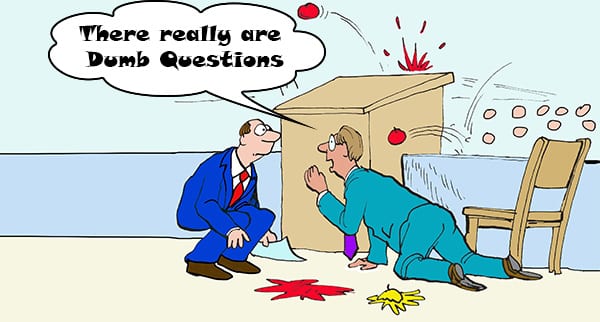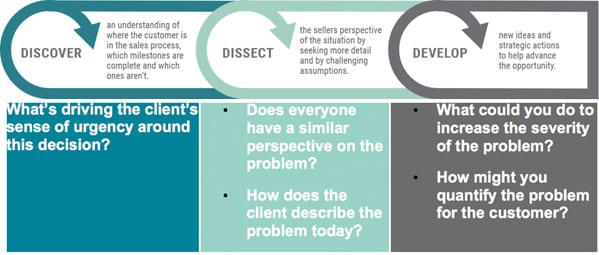
While speaking at a Sales Conference this past spring, I shared a few best practices around what top sales managers are doing to drive better sales results. Top coaches in any field understand the importance of challenging the individuals on their teams, pushing them beyond what they thought they were capable of doing. A person’s best efforts often come when he is pushed outside of his comfort zone. The best sales coaches do not employ a one-size-fits-all methodology, but rather tailor the approach according to the individuals they are trying to push. The goal is to help their team break through mental and physical barriers in order to achieve victory. In strategic opportunity planning, this often takes the form of asking questions that shake the reps’ settled ideas. So, after choosing the right targets and developing a preliminary strategy, it is time to ask really good questions.
What’s a good question?
While working with a capital equipment manufacturer, we saw the dangers of assuming the sales rep’s strategy is complete. Kathryn was one of the company’s top Sales Managers and she managed eight reps. Kathryn met with her team every Monday over the phone. Kathryn conducted one-on-one phone meetings with each sales rep to review the top accounts each was working on for the month. Kathryn and the rep talked about the top five targeted accounts each rep had targeted.
As part of our work with this client, we shadowed Kathryn during her Monday meetings. Her first call was with Mark, a solid if unspectacular performer, who usually hit his quotas. Mark had been with the company for two years.
Kathryn began by getting a list of Mark’s top accounts. Starting at the top of the list, Kathryn asked a series of questions about the account. Who was Mark’s main Advocate? Whom else did Mark know? Who were his Adversaries? What product was Mark selling? Why did the customer want it? What was the revenue potential? What stage was it in? When would it close? Did Mark need any help from her? Mark was able to answer the questions fairly quickly and effortlessly. Kathryn then went onto the next name on the list.
This Q & A process played out pretty much the same way for all of Kathryn’s reps with whom she met that day. She asked virtually the same questions of each rep, and each rep supplied her with answers. We wondered if every Monday looked and sounded the same way, with the list of accounts changing ever so slightly. What we most wanted to know was how valuable was the process for the individuals involved. For Kathryn, it was an all-day affair as she ploughed through information gathering. For the reps, it was also a time investment. We wondered about perceived return on that investment, so we dug a little deeper. What we learned was that the sales reps hated the weekly meetings. As one of the reps told us: “These meetings are almost always a waste of time. The information my manager wants can be found in Salesforce.com.”
While we wanted to commend our client for holding their managers accountable for regular and formal communication with their sales teams, we wondered if they knew how counterproductive the meetings were. At the basic level, you could say the meetings were not working because of the questions the manager was asking. Almost everyone involved in sales performance improvement today will tell you that a question-based customer contact model is a smart way to sell. We have known since the days of Socrates that questions tend to be more persuasive than statements do. This question-based approach is also effective in coaching.
However, what’s occasionally missed in all the hyperbole about using questions is that not all questions are created equal (and not all of them are equally effective). In other words, contrary to what your teachers have told you, there actually are dumb questions.
Questions, questions everywhere
The effectiveness of a questions-based approach stems from two primary sources. The first is the process itself. When it comes to persuasion, for instance, questions allow one party to express things from his perspective, his point of view. Essentially, questions allow someone to persuade himself, which is significantly more influential than having someone else tell him. As the old saying goes: If you say it, they can doubt it. If they say it, it’s true.
Kathryn and her sales management peers might have had the right intention, to meet with their sales reps on a regular basis, but they went awry when they established the purpose of the meetings. If a manager is meeting with their sales reps individually on a weekly basis, the purpose should be more than an account review. One way value is created from a sales manager is by helping the sales rep formulate a plan of action that they would not have developed on their own. If a manager is merely asking questions to Discover the background of the account, this has little value for the rep. Top performing sales managers know how to ask questions that challenge their sales reps thinking, they challenge the assumptions a rep might be making. We call this type of questioning, Dissect questions. Dissect questions are designed to encourage the sales rep to think about things that they might not have considered previously. These types of questions help the sales rep explore possible barriers or traps they might not have considered. Another type of questions top performing sales managers ask are those questions that get the sales rep to begin formulating specific actions. Too often managers and reps have a dialogue of good intent, they talk about the barriers and traps but don’t develop a smart plan to overcome those barriers. We believe it’s important to ask Develop Questions. Develop Questions help the sales rep think about what actions they should be taking to move the opportunity through the pipeline process.
In strategic coaching, the job of the sales manager is not to play “stump the reps” but rather to challenge their assumptions and conclusions about what seems to be happening in their accounts and what they are planning to do about it. In other words, it is less “what” and more “so what.”
Planning is key
Coming up with the questions that challenge our reps’ thinking requires planning. Just like we expect our sales reps to plan their questions before a sales call, top sales managers plan their questions prior to a strategic opportunity planning meeting. And just like in a sales call, we want to ask questions that cause the person receiving the question to stop and think, to consider potential implications, and to draw inferences. Moreover, an effective questioning strategy goes deep before it goes wide. That is, effective sales managers dig deeper on an issue before moving on.
We believe the Ignite Selling 3D Questioning Model™ might be a good framework to consider when it comes time to planning thoughtful questions. Below is the definition and an example of what a high impact series of questions might look like.
The key is to dig deeper into the areas where the sales manager can add value or where the rep might be making assumptions. In strategic opportunity coaching, the manager’s goal is to challenge their current thinking and fill information voids. To explore this topic further, please refer to this white paper on The Power of Strategic Coaching.

